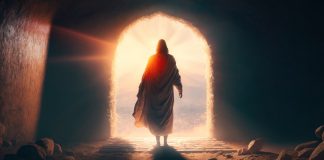The road to heaven passes by your neighbour
“A man was going down from Jerusalem to Jericho, when he was attacked by robbers. They stripped him of his clothes, beat him and went away, leaving him half dead. A priest happened to be going down the same road, and when he saw the man, he passed by on the other side. So too, a Levite, when he came to the place...
Who is Jesus?
Christians take their name from Jesus Christ. According to World Population Review, there are 2.38 billion Christian adherents across the globe. However, there is also a large portion of the world’s population who know little to nothing about Jesus. Research by Baxter in 2007 found that during that year, 30 million people would die without having heard about Jesus.
The portrait of Jesus (II): Jesus, the Lord and King
The Holy Scriptures call Jesus “the Lord”, that is, the Master. This was a respectful title used by slaves towards their masters in Antiquity. This is how subordinates addressed their superiors: children and their fathers; siblings, and their older siblings—or even a younger sibling who holds a high position.
The Ten Commandments
The book of Exodus is the second book in the Bible. It follows God’s servant Moses leading the Israelites out of slavery and through the desert towards the hoped-for Promised Land. Along the way, they stop at Mt Sinai. Moses goes up the mountain and receives from God ten commandments carved on a stone tablet. This is one of the most famous sections...
What did Jesus think about Himself?
Jesus Christ is certainly the most fascinating and controversial person in human history, if we look at how He has been understood throughout the history of Christian thought. But how did Jesus understand Himself?
Would Jesus be disappointed in the Church?
The dissonance between what church representatives say and what they do, the crises caused by sexual scandals, tolerating sin, not taking responsibility for mistakes and hiding them, and selling spiritual gifts for money, are just a few of the reasons why people say they’re disappointed in the Church.
Together to the end of the road
The journey "through the valley of the shadow of death" has never been easy. However, it has become increasingly lonely as our unfamiliarity with death has made us awkward and reserved when interacting with the dying.
Don’t come back…
If we were to make an assessment of today's Christianity, which kind of sacrifice would we notice more frequently—the kind offered by Cain or by Abel? Cain offered a sacrifice from the fruits of the earth, and Abel from the sheep of his flock. While Abel’s sacrifice was pleasing to God, Cain’s sacrifice was rejected. From the very beginning, God has expressed His...
Steps through the darkness: a testimony of saving faith
Sinking into darkness, after 14 years of enjoying all the spectacles of grace and beauty in which our world is enveloped, can be the beginning of tragedy. Or it can be the moment when you begin to discern, nuance by nuance, the splendour of a reality that healthy eyes so often miss.
A visit to Narnia
On the 22nd of November 1963, global attention was captured by the tragic assassination of American President J.F. Kennedy. On the same day, the death of one of the most influential Christians of the 20th century, the British writer and apologist C.S.Lewis, went almost unnoticed.
Faith that sees the miracle
I spent the end of high school in the Scandinavian school system. There, the teenager is confronted with the great questions of mankind in the context of social disciplines
The faith of a scientist
The field of science was flourishing, and amid its youngest and brightest, one student in particular consistently topped physics and chemistry courses, took its academic prizes and was courted with offers of scholarships by prestigious universities. His trajectory was toward the heights of the scientific world.
Like colours in a cheap fabric
Soviet soldier Bakhretdin Khakimov was declared missing in action during the war in Afghanistan, which claimed the lives of 15,000 USSR soldiers and more than a million Afghans. Thirty-three years later, his family found out he was alive, living as a true Afghan among his former enemies.
Strong prayers to the hidden God
No one has ever seen God, but the One who knew Him before He was born on this earth taught us all to address Him in prayer.
Rest and leisure: no one excuses distraction anymore
Nearly four millennia after the stone ratification of the law on weekly rest, the Universal Declaration of Human Rights (1948) reiterates the right of every person to rest and leisure.[1]


























